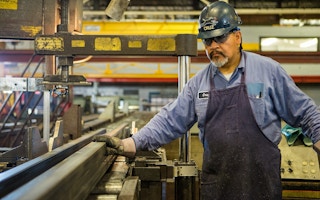It is March 31 and Belinda (not her real name), the head of human resources (HR) at an Asian-based financial institution, is sitting at her desk at home reviewing the notes she had just sent to the leadership committee. These are the priority areas her team is working on:
To continue reading, subscribe to Eco‑Business.
There's something for everyone. We offer a range of subscription plans.
- Access our stories and receive our Insights Weekly newsletter with the free EB Member plan.
- Unlock unlimited access to our content and archive with EB Circle.
- Publish your content with EB Premium.
“Talk to communications team to brief staff on implications of hiring freeze… Discuss with HR business partners on staff redeployment strategies… Prepare meeting with the president on employees affected by flights with infected passengers…. Work out additional staff benefits for all coping with work from home adjustments… Work with finance to structure employee donation to support efforts in local markets...”
Her already-full list keeps growing by the day.
In retrospect, just five weeks ago, none of these issues were on her radar. Her role seems to have changed dramatically as a result of the Covid-19 pandemic. It has suddenly become a mix of HR and sustainability.
Belinda wonders if her job title should actually be, chief human sustainability officer.
‘The greatest assets in our company are our people’
Since the outbreak started in January 2020, Covid-19’s impact on the world’s economies has been so massive that it has unravelled everything that our corporations and their millions of workers have endured over cycles of global crises.
Even from a sustainable business perspective, the priorities of battling the threats from climate change have been pushed back in light of more urgent issues – furloughed workers, digital adaptation and crudely, staying afloat.
As CEOs preach that ‘our people are our greatest assets’ to stakeholders everywhere, pressure mounts on them to make painful decisions in light of prolonged lockdowns. And the one person whose role is central in keeping these key assets intact, is the head of human resources.
The indispensable ‘S’ in ESG
For context, a growing number of companies have been integrating ESG (environmental, social and governance) factors into their business strategies. In a recent McKinsey survey, 70 per cent of respondents said their companies have a formal structure of sustainability in place. The usual suspects of sustainability governance until recently were mainly the CEOs or the most senior person in finance, risk, operations or overall sustainability.
“
For far too long, the world of corporate sustainability was focused on functions related to its products, operations and reputational influence. It is time we recognise the human element in all this.
However, Covid-19 has thrown up a new set of actors as critical in the sustainability agenda going forward - those whose functions involve addressing society’s needs.
Not that HR has not been a part of the sustainability conversation. In fact, in recent times, HR has been impacting several key agendas that form part of the responsible business mandate, including Gender Diversity, Business Codes of Conduct against discrimination and harassment, and Labour Relations.
However, in the post Covid-19 world order, in which 195 millions workers are set to lose their jobs by September 2020, the role of the Chief HR Officer (CHRO) is likely to become even more prominent.
An extended crisis response, with people in mind
Faced with the prospect of business un-usual as the new norm, to what extent does the CHRO’s role change?
To ensure business can sustain while job losses minimised, CHROs need to work in tandem with the rest of senior leadership to consider reconfiguring workflows, redeploying talent or reskilling staff to help them stay relevant. New family-friendly policies for virtual work life are being drafted and introduced, while future models of work with digitalisation in mind will likely be established.
Covid-19’s unlocking of HR’s role in achieving the Sustainable Development Goals
Ensuring financial security of all workers - SDG 1 (No poverty), SDG 10 (reduced inequalities)
Protecting health and well-being across its people value chain – SDG 3 (Good Health & Well-Being)
Providing learning and education on staying resilient and productive – SDG 4 (Quality Education)
Ensuring gender inclusive policies & programs–SDG 5 (Gender Equality)
Protecting jobs – SDG 8 (Decent work & Economic growth)
Providing and planning infrastructure for a future world of virtual working – SDG 9 (Industry, Innovation & Infrastructure)
Partnerships with the government and others through COVID 19 and thereafter – SDG 17 (Partnerships)
Greater education is required across the board. Training must go on – mostly virtually – as all employees need to understand not just the current health risks and new safety protocols, but also their respective leadership roles in responding to risks from disruptions in the supply chain, business continuity and further along, threats from climate change.
The pandemic has also stretched the CHRO’s role in its adeptness to partnerships. Often considered the relationship managers of the business, HR heads at business units have to work closely alongside the line managers to ensure financial inclusivity and security are mainstreamed across all rank and file.
Within local jurisdictions, working with the legal and regulatory teams is also necessary to lobby governments for policies and incentives that protect jobs and incomes of employees across the value chains.
From an organisation’s impact perspective, the CHRO needs to work beyond its own organisational remit, and with their supply chain officers to ensure that the working poor in their supply chains – the most vulnerable groups whose incomes fall below the poverty line – are not left behind.
What happens post-Covid19?
Prior to the pandemic, lean business models and a growing generation of workers seeking flexibility have allowed for the gig economy to flourish.
However, Covid-19 throws a curved ball that has resulted in assignments dried up, loss of income, and more. Developed nations may have lobby groups that help secure basic rights for gig workers, but the developing world, much of which works in the informal economy, will see millions with literally nothing left to feed their families. How this plays out remains to be seen.
One thing is for sure, the pandemic could prove that no gig economy can survive without strings attached. We may all embrace flexible work structures, but the CHRO must ensure equal rights, fair wages and health insurance are remodelled into contracts.
And if we look further into the future, when the crisis tails off and some normalcy returns, what will be required of the CHRO in helping the company’s leadership and its workforce regain morale and confidence?
The moral compass of a sustainable business
For far too long, the world of corporate sustainability was focused on functions related to its products, operations and reputational influence. It is time we recognise the human element in all this.
The leaders who protect the well-being of their employees and engage them to go the extra mile are well positioned to instill a moral compass rooted in sustainable values. They put the incentives in place so that purposeful leadership grows and thrives in business. And that is why the Chief People Officers are the most critical sustainability leaders we could have in our businesses today.
————————————
This opinion piece is co-written by Amita Chaudhury and Junice Yeo. Amita Chaudhury is the former global director of diversity and regional head of sustainable business for Unilever, currently on a secondment with the UN Global Compact as senior advisor on sustainability learning for business. Junice Yeo is deputy managing director at Eco-Business.













